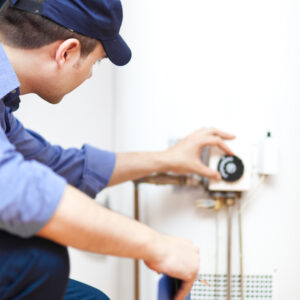While water heaters may come in many different shapes and forms, one commonality among all types of water heaters is that general maintenance helps ensure your unit runs efficiently and without problems for years to come.
Performing a visual inspection of your water heater every few months will help prevent costly repairs of the unit and reduce or eliminate a costly water damage occurrence. Below are some tips specific to the various styles of water heaters.

With electric, gas, and hybrid style water heaters, inspect the top and bottom of the unit for water leaks. A water leak at the top of the unit can be caused by a loose cold-water inlet or hot-water outlet or the T&P (temperature and pressure relief) valve may have failed. Water leaking from the bottom could be caused by normal condensation, or it could be a sign of a leaking element gasket or water overflowing the overflow component due to excessive pressure in the tank. In some cases, the tank itself can leak, which may require replacement. Water heaters often make harmless noises when heating, but if you hear popping, hissing, or knocking sounds it could be sediment build-up in the bottom of the tank.
An annual cleaning of your water tank is recommended to prolong its life span. Before performing any maintenance, read the owner’s manual. When in doubt, call a certified technician to assist.
Maintenance on tankless, on-demand hot water heaters should be performed by a certified technician. Since there is no tank on these models, scale build-up can be an issue. Flushing or cleaning of the system is periodically required. It is best to refer to the owner’s manual of your specific water heater to identify the best cleaning process. Be sure to use a proper venting system to exhaust hot air generated by the system to prevent your unit from overheating and breaking down. On-demand systems also produce water condensation which is acidic and can corrode drainpipes if improper drainage occurs over time. Ask a technician to confirm that your water heater is draining properly.
Whichever style unit you have, when in doubt, a great policy is to refer to your owner’s manual to identify best practices, and, if necessary, call a certified technician for maintenance.